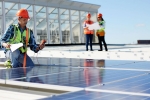Infrastructure development: Lobbying to accelerate the MRT project
This article has been translated by PwC Indonesia as part of our Indonesia Infrastructure News Service. PwC Indonesia has not checked the accuracy of, and accepts no responsibility for the content.
Bisnis Indonesia - Pembangunan infrastruktur: Lobi-lobi percepat proyek MRT
4 Desember 2023
By: Lorenzo A. Mahardhika & Stefanus Arief Setiaji
The International Maritime Organisation (IMO) event held in London, UK, becomes a momentum utilised by the Indonesian government to lobby stakeholders from various countries regarding transportation infrastructure projects in Indonesia.
At the IMO event, Transportation Minister Budi Karya Sumadi met with Japanese Agrarian, Infrastructure, Transportation, and Tourism Minister Kokuba Konosuke.
One of the discussions at the event was about the cooperation with Japan to develop Mass Rapid Transit (MRT) phase 2A that connects Bundaran HI – Jakarta Kota.
During the occasion, Budi Karya pushed for the project to be completed on schedule.
“Constructing urban mass transportation in Greater Jakarta is a necessity. The ongoing construction of the MRT across different corridors is expected to enhance people’s mobility and alleviate issues like traffic congestion and air pollution,” Budi said on Monday (27/11).
He said that the Indonesian government was boosting the completion of Contract Package (CP) 205, a significant part of MRT phase 2A. This package encompasses the construction of vital components such as the signalling, telecommunications, operating, and power systems as well as the railway tracks.
“We hope that the support from the Japanese government will encourage Japanese companies to participate in the tender for CP205,” the Transportation Minister said.
The cooperation contract is set to be signed in December.
The construction of MRT phase 2 is a national strategic project (PSN). Phase 2 is further divided into two subsequent phases, namely phases 2A and 2B.
Phase 2A that connects Bundaran HI – Jakarta Kota spans 5.8 kilometres. It goes through seven underground stations, namely Thamrin, Monas, Harmoni, Sawah Besar, Mangga Besar, Glodok, and Kota.
Meanwhile, phase 2B connects Jakarta Kota – West Ancol. It is currently still in the feasibility study stage.
PT MRT Jakarta is targeting phase 2A that has several contract packages to be completed between 2028 and 2029.
MRT phase 1 that has already operated currently connects Lebak Bulus to Bundaran HI. The project that is funded by the state budget (APBN) and the regional budget costs around Rp16 trillion.
MRT phase 2 is predicted to cost around Rp25 trillion-Rp26 trillion.
East-west corridor
Meanwhile, in the middle of November 2023, the government has signed minutes of meeting on the assessment of MRT east-west corridor phase 1 stage 1.
Jakarta MRT’s east-west corridor will span 84.1 km from Balaraja, Tangerang, to Cikarang, Bekasi. The construction will be divided into four stages.
According to Budi Karya, besides soft loans, other creative funding schemes are necessary to meet the budgetary needs.
“I hope that there will be more collaborations between the Indonesian government and the Japanese government in the railway sector,” he stated.
Moreover, Railways Director General of the Transportation Ministry Risal Wasal mentioned that, after the signing of the minutes of meeting, the Transportation Minister would complete the administrative requirements of the project.
“We are targeting the administrative matters to be completed. So, the development of the MRT’s east-west corridor can commence in 2024,” he said.
The construction of Jakarta MRT east-west corridor phase 1 is divided into four stages, namely phase 1 stage 1 (Tomang-Medan Satria spanning 30.1 km), phase 1 stage 2 (Kembangan-Tomang spanning 9.2 km), phase 2 East (Medan Satria-Cikarang spanning 20.5 km), and phase 2 West (Kembangan Balaraja spanning 29.9 km).
“Jakarta MRT’s east-west corridor will be integrated with the north-south corridor. The meeting point will be at Thamrin Station that is currently under construction,” Risal said.
At the start of the construction, phase 1 stage 1 of Jakarta MRT’s east-west corridor will have 21 stations that consist of eight underground stations and 13 elevated stations. Besides that, at this stage, a depot will be constructed in Rorotan with an access route spanning 5.9 km.
Next article: PUPR Minister: PUPR Ministry completed 99 PSNs
















